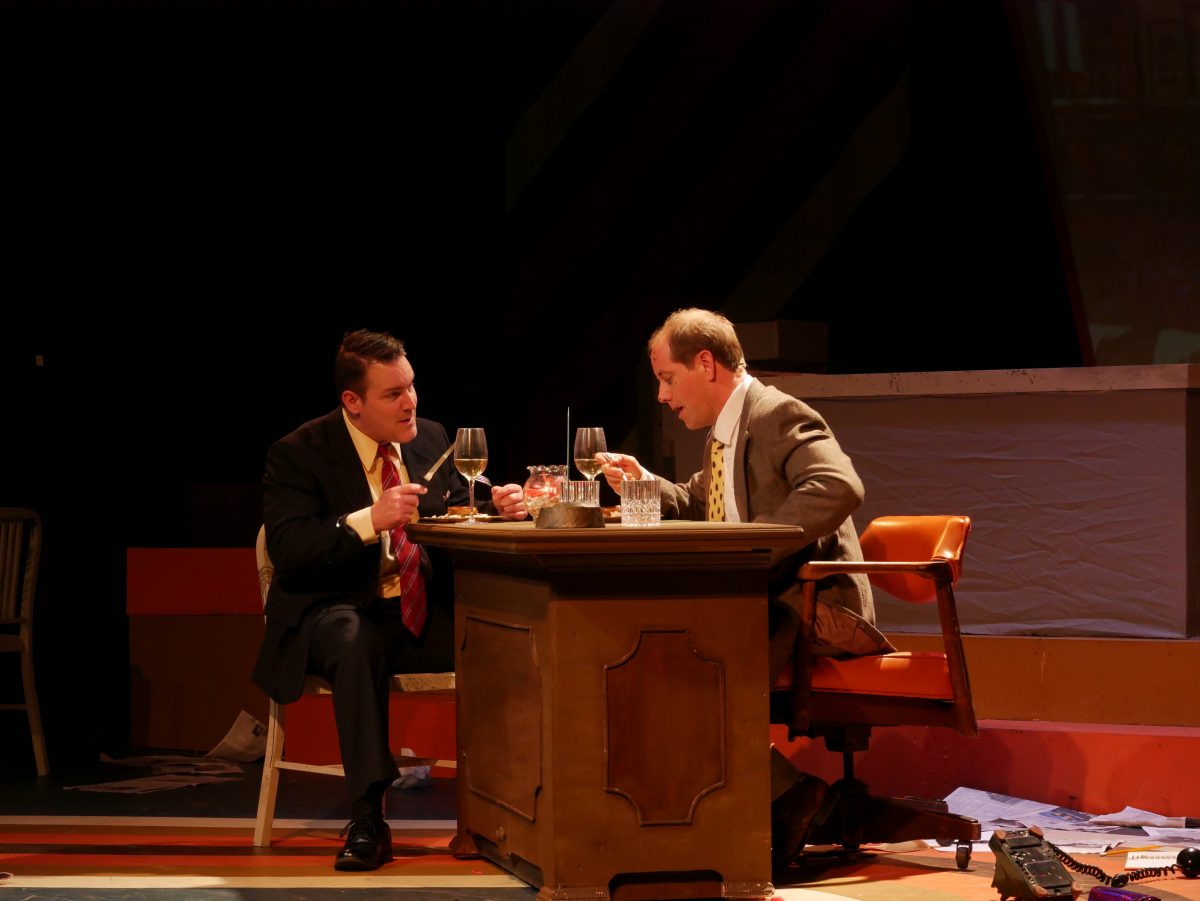Rupert Murdoch is 92 and has an unusually active existence in real life — in the last year alone he’s continued wielding power as a media tycoon, has given depositions and will likely testify in the Dominion Voting Systems lawsuit against Fox News, he divorced Jerry Hall, he announced his engagement to someone else, and then called it off (apparently due to her religious zealotry).
And then there’s what’s going on not in real life, particularly the popular HBO series Succession that is based on him and his media empire and family — although the fictionalized account seems to bother the real family quite a lot. Another dramatic work involving him is the play Ink by James Graham, which is closing this weekend at Circuit Playhouse.
The play is fiction but is based on one of the key events in Murdoch’s ascension in the media world when he acquired a failing newspaper in England in 1969 and turned it into a brash tabloid that broke rules aplenty and set a tone in journalism that we still witness today.
The story is about how Murdoch hired a friend of his, Larry Lamb, and charged him with beating the circulation numbers of the competition. The result was a crass mix of sensationalistic news reporting, goofy diversions, pictures of scantily-clad women, and low common denominator entertainment. The Sun diminished the practice of journalism and won the circulation war.
Ink is helmed by Warner Crocker, a Chicago-based director who has done plays in Memphis before. He was fascinated by the play and was eager to do the production.
“I’ve read a lot of scripts all my life,” he says. “You read good ones and you read not so good ones, and every now and then you stumble on one you get an opportunity to direct where you go, ‘this is a story I have to tell.’ This was a piece that talks about a moment in time that not only affected what journalism was going to become, but the changes we have experienced in culture, in politics, and just about every facet of our life.”
Crocker says Murdoch “is one of those individuals who, if the planet is still around 200 years from now, they’ll look back and say, he had an influence on everything and changed everything, for better or worse.”
He says that in his discussion with the cast, he likened the story to Frankenstein. “Murdoch in many ways is Dr. Frankenstein and Larry Lamb becomes the monster,” he says. “Graham presents Murdoch as a product of the moment in time who had this idea about change and didn’t necessarily understand the personal consequences of that. He certainly understood the financial consequences, and that’s what he was reaching for.”
When the changes Murdoch set in motion are underway, he finds that it’s not all a thrilling game and that there are terrible downsides. The cocky publisher is forced to reckon with tragedy. “You wouldn’t think of him as a very vulnerable individual,” Crocker says.
But neither is Murdoch a hero. In fact, as Crocker notes, there are no heroes in this play. “We watch them all take this journey together,” he says. “For example, the newsroom staff that you meet in the play come into it and there’s hesitation to begin with, but then they fall in love with the excitement and the romance of creating something new and the success that they’re having.”
It’s thrilling to break the rules and have so much fun, but before long, the staff’s “journalistic morals are challenged by some of the things that their boss is asking them to do to drive circulation. And then decisions have to be made. Do I compromise who I am and what I believe to hang on to this job? Or am I going to move on?”
Key to the effectiveness of the play is the pacing — snappy dialogue, barbed banter, and wisecracks are blended in with newsroom chaos, pressroom drama, slamming of phones, and tales told literally on multiple levels.
“You have to create a sense of momentum where the show is always going,” Crocker says, “because if you stop and think, give the audience the opportunity to stop and think too much about what they’ve just seen, they’re gonna miss the next beat. It’s history unfolding before your eyes and history doesn’t usually give us a chance these days to pause and think about it. I like to put that on the stage.”
Ink runs April 14th through 16th at Circuit Playhouse. Tickets and info here.


